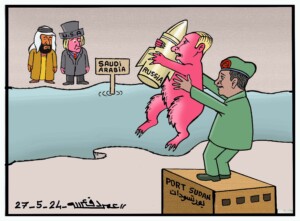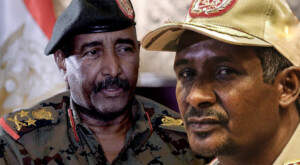Sudan Revolutionary Front ‘committed to comprehensive political solution’
The Sudan Revolutionary Front (SRF), a coalition of Sudanese armed movements, has renewed its commitment to a comprehensive political solution that achieves peace and paves the way for democratic transformation by addressing the roots of the Sudanese crisis.
 The leaders of the Sudan Revolutionalr Front meeting in Paris yesterday (SRF)
The leaders of the Sudan Revolutionalr Front meeting in Paris yesterday (SRF)
The Sudan Revolutionary Front (SRF), a coalition of Sudanese armed movements, has renewed its commitment to a comprehensive political solution that achieves peace and paves the way for democratic transformation by addressing the roots of the Sudanese crisis.
In a statement issued yesterday after the meetings of its Leadership Council that took place in the French capital of Paris from 27 to 29 October, the Front The SRF, currently chaired by Minni Minawi, leader of the SLM-MM, stressed its adherence to the comprehensive political solution and set a package of requirements for the holding of free and fair elections.
Comprehensive solution
Mohamed Zakariya, the spokesman for the Front, said in a statement that the Front has responded favourably to the initiatives calling for reaching a political solution that does not exclude anyone according to the international and regional references represented by the African Peace and Security Council resolutions 456 and 539 and the African Union (AUHIP) roadmap.
The statement strongly rejected the continued attempts to downsize the Unamid peacekeeping mission in Darfur, and end its role in the protection of civilians through a plan in preparation for ending its existence before achieving peace and security.
It stressed that free and fair elections are a proven mechanism to achieve the peaceful transfer of power, but stressed that it is a process that requires benefits and conditions that are not currently available; including stopping the war, achieving peace, guaranteeing freedoms, conducting a census as well as an agreed electoral law and independent national mechanisms.
Violation of human rights, freedoms
The SRF condemned the violations of human rights and the violation of public freedoms, especially the freedom of the press and expression.
The statement condemned the ill treatment of prisoners of war in the prisons and called on the government to disclose the places of detention of prisoners and allow them to enjoy the rights of prisoners guaranteed by the international conventions on the protection of the rights of prisoners, especially the Geneva Conventions.
The statement also called for the immediate release of all political prisoners and prisoners of war.
The Front also called for the repeal of laws restricting freedoms, particularly the National Security Law and the Public Order Law, which humiliate Sudanese women.
The statement condemned the systematic targeting of university students, especially the Darfuri students, through physical elimination, arbitrary dismissal and continuous security pursuits.
In its statement, the Front also condemned the continuation of erroneous policies in the construction of dams, their negative consequences, the burning of palms and illegal mining, the sale of land in the Northern State and other parts of Sudan to foreign companies and the expropriation of land belonging to cooperative societies and their ownership of companies owned by the regime’s affiliates which threatens the existence of the people in their historical lands.
Armed struggle, peace talks
The SRF was established in November 11, 2011, by the leaders of the four main armed movements in the country: the Sudan Liberation Movement under the leadership of Abdelwahid El Nur (SLM-AW), the SLM-MM faction, the Justice and Equality Movement (JEM), and the Sudan People’s Liberation Movement-North (SPLM-N).
They declared at the time that they would overthrow the regime of the National Congress Party (NCP) “using all available means”. Two small opposition groups headed by Nasreldin El Hadi El Mahdi and El Tom Hajo became member in 2012. The following year, the eastern Sudanese United People’s Front for Liberation and Justice (UPFLJ), led by Zeinab Kabbashi, joined the coalition.
The SLM-AW withdrew from the SRF, when the coalition opted for a peaceful solution. Its founder and leader Abdelwahid El Nur says he will only join peace negotiations after Khartoum has restored stability and security in Darfur.
The SRF members agreed on the Sudan Call (also referred to as Sudan Appeal), a two-page political communiqué calling for regime-change and democracy, together with representatives of the National Umma Party, the National Consensus Forces (NCF, a coalition of opposition parties), and the Civil Society Initiative. It was signed in Addis Ababa on December 3, 2014. Other Sudanese opposition groups and parties joined the alliance in the following year.
The members of the Sudan Call have met several times with the AU High-level Implementation Panel (AUHIP) to discuss the ways peace can be reached in Darfur, South Kordofan and Blue Nile states.
In an attempt to revive the repeatedly stalled peace negotiations with Khartoum, the AUHIP prepared a roadmap agreement in early 2016. It was signed by the representatives of the Sudanese government in March. The Sudan Call forces however initially refused the document, but did sign it months later, in August.
Rounds of separate peace talks followed between the Sudanese government and the SPLM-N concerning South Kordofan and Blue Nile, and between Khartoum and the Darfuri movements SLM-MM and JEM. Both tracks however failed to reach an agreement.
In July this year, a German initiative to invite the warring parties for “informal consultations” failed as well.











 and then
and then